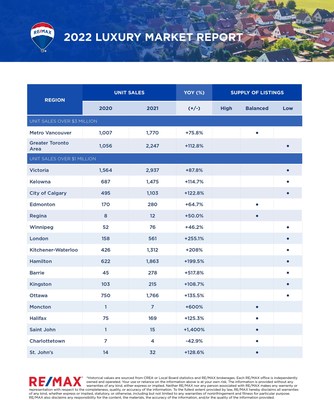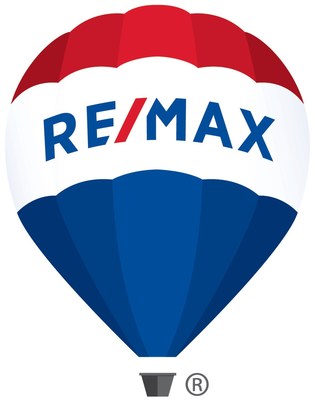Luxury home sales double and triple year-over-year as buyers seek properties across the country

"The currency of home ownership has clearly taken on a new dimension in 2021," says
The RE/MAX
According to an analysis of sales provided by RE/MAX brokers and agents based on local real estate board data, RE/MAX
"As high as these numbers are, we believe they just scratch the surface," says Alexander. "In our view, these levels likely do not truly reflect what is happening in markets across the country, given an abundance of exclusive sales and in white-hot markets such as
Last year marked the continuation of a pandemic-fuelled buying spree that started in 2020, shattering existing records for luxury home sales and in some instances, price points from coast to coast.
"Despite a third and fourth wave of Covid-19 in 2021, real estate markets continued to rattle and hum," says
RE/MAX brokers who were surveyed for the report attributed the increase in luxury activity to abundant economic drivers, as the national roll-out of the vaccines continued. Stock markets rallied, with the TSX, the S&P and the Nasdaq reporting some of their best years on record. Interest rates remained at historically low levels. GDP growth for the year is estimated at 4.5 per cent in 2021 as businesses returned to pandemic norms–including hybrid schedules—restaurants, bars, gyms, sports venues and theatres finally opened their doors.
Trade-up activity was brisk in most markets, as buyers cashed in on substantial equity gains realized when selling their existing properties.
"More so than ever before, it appears that buying a home is a retirement strategy which many people believe will help that next generation achieve home ownership," says Ash.
Real estate has traditionally been an essential asset class in the investment portfolios of ultra-high net worth individuals, usually comprised of multi-unit residential, commercial, industrial, and land. Residential performance, however, has been undeniable over the past decade, and that has generated global attention. Financial communities have also tapped into the trend, with Real Estate Investment Trusts (REITs) now investing in single-family residential housing in the US and to a lesser extent,
REPORT HIGHLIGHTS:
- Luxury home-buying activity is spilling into smaller centres where the dollar goes further. While the pandemic accelerated the trend, bigger bang for the buck is likely to continue to draw purchasers from larger centres, particularly in
Ontario . Inventory is reaching critical levels in markets likeLondon ,Kitchener-Waterloo ,Hamilton ,Barrie ,Kingston andOttawa . - Home sales are pushing into higher price points across the country. The luxury segment over
$3 million represents approximately four per cent of total sales in Metro Vancouver and 1.8 per cent of sales in the GTA. Sales over$1 million inHalifax -Dartmouth represent 2.2 per cent of total sales. - Records were broken for luxury sales over
$3 million in theGreater Toronto Area in 2021, while Metro Vancouver fell short of 2016 record levels by just over 200 sales. - Condominium sales over the
$3 million price point in the GTA and Metro Vancouver have rebounded from 2020, setting a new record in the GTA and matching the existing record set in 2016 in Metro Vancouver. The GTA saw 106 condominium units sold in 2021, an increase of 82.8 per cent over 2020 levels, while 144 units changed hands in Metro Vancouver, up 44 per cent over the previous year. - RE/MAX brokers have reported an upswing in non-resident buyers in Metro Vancouver and
Halifax -Dartmouth in 2021, however domestic buyers continue to drive luxury sales in theGreater Toronto Area . - An increase in young entrepreneurs has been noted in the GTA, with some utilizing crypto-currency gains to make their way into the housing market. Family wealth has also contributed to the increase in luxury home sales, with many parents freeing up the reins so the kids can enjoy the fruits of their labour.
- Despite the existence of three taxes aimed at foreign ownership in Metro Vancouver – the 20-per-cent Foreign Buyer Tax, the two-per-cent Speculation and Vacancy Tax (SVT), and the three-per-cent Empty Home Tax and the 15-per-cent Non-Resident Speculation Tax targeting sales in
Ontario's Greater Golden Horseshoe Area—non-resident buyers are returning toCanada's residential housing markets. - Sales of building lots have declined at the top end as buyers are reluctant to embark on construction when costs are unclear, labour is hard to find, and supply chain disruptions can add years to the custom-building process.
- Inventory is balanced over the
$3 million price point in Metro Vancouver while just 200 such homes are currently listed for sale inToronto proper. Supply levels are exceptionally low in 50 per cent of markets surveyed for this report, including the GTA,Victoria ,Kelowna ,London ,Kitchener-Waterloo ,Hamilton ,Barrie ,Kingston andOttawa .
About the 2022 Luxury Market Report:
The 2022 RE/MAX Canada Luxury Market Report includes data and insights supplied by RE/MAX brokerages. RE/MAX brokers and agents were surveyed on market activity and local developments based on local board data and market activity in 2020 and 2021.
About the RE/MAX Network
As one of the leading global real estate franchisors,
Forward looking statements
This report includes "forward-looking statements" within the meaning of the "safe harbour" provisions of the United States Private Securities Litigation Reform Act of 1995. Forward-looking statements may be identified by the use of words such as "believe," "intend," "expect," "estimate," "plan," "outlook," "project," and other similar words and expressions that predict or indicate future events or trends that are not statements of historical matters. These forward-looking statements include statements regarding housing market conditions and the Company's results of operations, performance and growth. Forward-looking statements should not be read as guarantees of future performance or results. Forward-looking statements are based on information available at the time those statements are made and/or management's good faith belief as of that time with respect to future events and are subject to risks and uncertainties that could cause actual performance or results to differ materially from those expressed in or suggested by the forward-looking statements. These risks and uncertainties include (1) the global COVID-19 pandemic, which has impacted the Company and continues to pose significant and widespread risks to the Company's business, the Company's ability to successfully close the anticipated reacquisition and to integrate the reacquired regions into its business, (3) changes in the real estate market or interest rates and availability of financing, (4) changes in business and economic activity in general, (5) the Company's ability to attract and retain quality franchisees, (6) the Company's franchisees' ability to recruit and retain real estate agents and mortgage loan originators, (7) changes in laws and regulations, (8) the Company's ability to enhance, market, and protect the RE/MAX and Motto Mortgage brands, (9) the Company's ability to implement its technology initiatives, and (10) fluctuations in foreign currency exchange rates, and those risks and uncertainties described in the sections entitled "Risk Factors" and "Management's Discussion and Analysis of Financial Condition and Results of Operations" in the most recent Annual Report on Form 10-K and Quarterly Reports on Form 10-Q filed with the

SOURCE RE/MAX
© Canada Newswire, source


